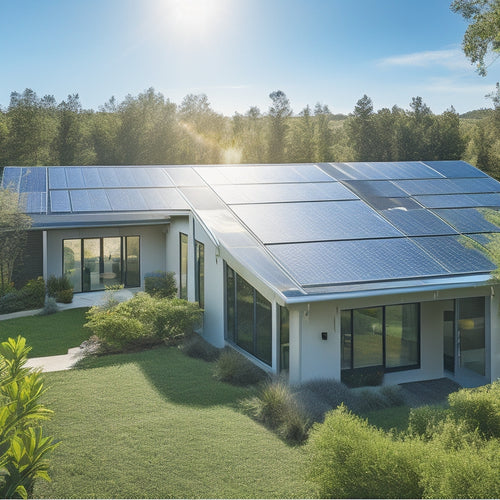
House Solar Batteries
Share
You've invested in a solar panel system, but without a reliable energy storage solution, excess energy generated during the day is wasted, leaving you reliant on the grid at night. House solar batteries provide a solution, storing excess energy for nighttime use, promoting energy independence, and reducing reliance on the grid. Advanced lithium-ion batteries offer reliable and efficient energy storage, outperforming lead-acid batteries in durability and capacity. Optimizing battery efficiency, charging cycles, and capacity selection is essential for maximizing energy self-sufficiency and backup power during outages. Now that you've started exploring the world of house solar batteries, you'll want to uncover more details on how to tailor a system to your specific energy needs.
The Essentials
- House solar batteries store excess energy generated during the day for nighttime use, promoting energy independence after sunset.
- High-quality lithium-ion batteries offer reliable and efficient energy storage solutions, outperforming lead-acid batteries in durability and cost-effectiveness.
- Solar batteries provide backup power during outages, ensuring a steady electricity supply for home appliances and maintaining home functionality during grid failures.
- Proper battery sizing and capacity selection are essential to meet specific energy demands, balancing energy storage needs with energy consumption patterns.
- Advanced energy management systems can reduce waste and maximize potential, enhancing overall system performance and promoting a sustainable and cost-effective power solution.
Energy Independence at Night
You're likely wondering how you'll power your evening activities when the sun goes down.
With a house solar battery, you can store excess energy generated during the day for nighttime use, ensuring you have a reliable source of power when you need it most.
Nighttime Energy Storage
As the sun sets, your solar panels stop generating electricity, leaving you reliant on the grid or backup power sources to meet your nighttime energy needs. This is where nighttime energy storage comes in - an essential component of achieving energy independence at night.
With a house solar battery, you can store excess energy generated during the day for use during the night. This not only reduces your reliance on the grid but also optimizes your energy self-sufficiency.
In addition, high-quality solar panel batteries, such as Lithium-Ion Batteries, can provide a reliable and efficient energy storage solution, guaranteeing that you have a stable power supply even during periods of low sunlight or at night.
When selecting a house solar battery, consider factors that impact its performance, such as battery efficiency and charging cycles. A high-efficiency battery guarantees that more of the stored energy is available for use, while a battery with a high number of charging cycles can withstand the demands of daily charging and discharging.
Powering Evening Activities
With the evening hours approaching, your house solar battery takes center stage, powering your evening activities while maintaining energy independence at night.
By integrating a battery storage system into your solar setup, you can release the full potential of renewable energy and create a more sustainable, dependable, and cost-effective power solution solar energy storage.
As the sun sets, your solar panels cease to generate electricity, but your battery kicks in, providing a seamless shift to stored energy.
This guarantees you can continue to enjoy your daily routines, from cooking dinner to watching your favorite TV show, without relying on the grid.
Backup Power During Outages
You get power when you need it most with house solar batteries, which provide backup energy during outages.
With a reliable backup power system like home energy storage, you can guarantee a steady supply of electricity to your home appliances, even when the grid fails.
By going grid-independent, you make certain your home remains functional even when the grid fails.
With a reliable backup power system, you can weather any outage with confidence.
Power When You Need
Having a reliable source of power during outages is vital, especially when the grid goes down unexpectedly. With a house solar battery, you can guarantee a steady supply of energy when you need it most. This backup power system integrates seamlessly with your solar panel array, providing a sustainable living solution that reduces your environmental impact.
By storing excess energy generated during the day, you can enjoy energy cost savings and reduced reliance on the grid. Advanced battery technology advancements enable efficient energy storage, allowing you to tap into this reserve during power outages. This means you can continue to power your essential appliances, keeping your home comfortable and secure.
Effective home energy management is essential in maximizing the benefits of your solar system. By monitoring your energy usage and adjusting your habits accordingly, you can optimize your energy efficiency.
With a house solar battery, you're not only reducing your carbon footprint but also enjoying the freedom to live life on your own terms, without worrying about power outages disrupting your daily routine.
Grid Independent Homes
Grid independence is now a reality, thanks to advanced house solar batteries that provide backup power during outages. You can now break free from the grid and enjoy uninterrupted energy supply, even during natural disasters or utility outages.
With a grid-independent home, you'll reap solar savings and environmental benefits, reducing your carbon footprint and reliance on fossil fuels.
While installation costs may seem steep, government incentives and decreasing prices make it more accessible. Proper battery maintenance guarantees peak performance and extends the lifespan of your system.
Technology advancements have improved energy efficiency, allowing you to store excess energy generated during the day for use at night or during outages. As the industry continues to evolve, future trends suggest greater grid integration, enabling you to sell excess energy back to the grid and further reducing your energy bills.
With consumer choices expanding, you have the freedom to design a system customized to your needs, giving you complete control over your energy destiny.
Depth of Discharge Control
When configuring your house solar battery, you'll need to set a maximum depth of discharge (DOD) to guarantee the battery's longevity, especially when considering an off-grid energy storage system.
This is essential as deep cycle batteries, like those used in solar panel battery backup systems, are designed to handle regular deep discharges.
This setting determines how much of the battery's capacity can be safely used before recharging begins.
Maximum Depth Settings
Your solar battery's maximum depth setting, also known as depth of discharge (DOD) control, determines how much of its capacity is employed before recharging begins. This setting has a significant impact on your battery's lifespan, as excessive discharging can reduce its overall capacity.
By setting a maximum depth, you can guarantee ideal charging and discharging patterns, which helps prolong the battery's lifespan. A higher maximum depth setting allows your battery to supply more power before recharging, but it also increases the risk of deep discharging, which can be detrimental to the battery's health.
Conversely, a lower maximum depth setting reduces the available power but helps maintain a healthier battery state of charge. You'll need to strike a balance between these two extremes to find the ideal maximum depth setting for your specific needs.
Preventing Over-Discharge
Setting the maximum depth of discharge is only half the battle - you also need to confirm that your solar battery doesn't over-discharge. Over-discharge can severely reduce your battery's lifespan, making it essential to implement discharge protection measures. This is where battery management comes in.
A well-designed battery management system (BMS) will continuously monitor your battery's state of charge, voltage, and temperature. If the BMS detects an over-discharge event, it will disconnect the load to prevent further discharge. This guarantees your battery doesn't drop below the minimum safe level, thereby protecting it from damage.
You can also set a low-voltage disconnect (LVD) threshold, which will automatically disconnect the load when the battery voltage falls below a certain level. This adds an extra layer of protection against over-discharge.
Watt-Hour Capacity Matters
You need to determine your energy storage needs to choose the right watt-hour capacity for your house solar battery. The capacity you require will depend on how long you want your power backup to last during an outage, as well as the total wattage of the appliances you want to power.
With renewable energy solutions, homeowners can enjoy a reliable energy storage solution that reduces electricity bills and provides a smooth power supply during outages.
Energy Storage Needs
Energy storage systems must be sized to meet specific energy demands, and one essential aspect of this is determining the required watt-hour capacity.
You'll need to calculate your energy storage needs based on your daily energy usage, considering factors like appliance efficiency and your desired level of energy independence. A thorough assessment of your energy requirements will help you determine the ideal solar battery size for your system.
When evaluating energy storage needs, consider your solar battery efficiency, as it directly impacts the overall performance of your system.
Look for batteries with high round-trip efficiency, as they'll provide more usable energy per cycle. Additionally, consider investing in advanced energy management systems that can enhance energy distribution, reducing waste and maximizing your solar battery's potential.
Power Backup Duration
Accurate sizing of your energy storage system is critical, and one key aspect of this is determining the power backup duration you need.
You'll want to take into account how long you need your solar battery to provide power during an outage or at night. This depends on your energy usage, the size of your solar array, and the type of battery you choose. A longer power backup duration typically requires a larger solar battery with higher watt-hour capacity.
When selecting a solar battery, you'll need to balance power backup duration with charging efficiency and solar battery lifespan. A higher-capacity battery may provide longer backup power, but it may also reduce charging efficiency and increase the upfront cost.
On the other hand, a lower-capacity battery may be more cost-effective, but it may not provide enough backup power. You'll need to strike a balance between these factors to guarantee your energy storage system meets your needs.
Lithium-Ion Beats Lead-Acid Tech
You'll find that lithium-ion batteries have a significant durability advantage over lead-acid batteries, with a longer lifespan and more charge cycles.
This means you'll get more bang for your buck, as lithium-ion batteries can last up to 15 years or more, compared to lead-acid's 5-7 years.
With lithium-ion, you'll also experience less capacity loss over time, ensuring your solar power system remains efficient and effective.
Lithium-Ion Durability Advantage
When it comes to solar batteries, one essential aspect is their lifespan, as it directly affects the overall performance and cost-effectiveness of the system. You want a battery that will last for years to come, providing you with the freedom to generate and store your own clean energy.
Lithium-ion batteries have a significant durability advantage over lead-acid technology. They boast a longer battery lifespan, with some manufacturers offering warranties of up to 10 years or more. This extended lifespan is due to lithium-ion's high lithium efficiency, which enables the battery to retain its capacity to store energy even after numerous charge and discharge cycles.
In contrast, lead-acid batteries typically last around 5 years, requiring more frequent replacements and increasing your overall system cost. With lithium-ion batteries, you can enjoy a longer period of worry-free energy storage, giving you the freedom to focus on what matters most – living life off the grid.
Frequently Asked Questions
How Long Do House Solar Batteries Typically Last?
When you invest in a battery, you're probably wondering how long it'll last. Typically, a battery's lifespan ranges from 5 to 15 years, depending on maintenance requirements, such as charging cycles and temperature control, which you'll need to manage to maximize its duration.
Can I Install Solar Batteries Myself?
When taking on a DIY project, you can install solar batteries yourself, but be aware that it requires careful planning, following installation tips, and taking necessary safety precautions to avoid electrical shock and fire hazards.
Are House Solar Batteries Environmentally Friendly?
You're wondering if energy storage solutions are eco-friendly. The good news is that they promote energy efficiency and reduce your carbon footprint by storing excess energy generated from renewable sources, allowing you to use clean power on demand.
Do Solar Batteries Work With Existing Solar Panels?
You'll find that most solar batteries are designed to work seamlessly with existing solar panels, ensuring ideal solar panel compatibility and maximizing energy storage efficiency, giving you the freedom to utilize renewable energy on your terms.
Can I Charge My Car With a House Solar Battery?
Imagine fueling your daily commute like filling a cup from a rejuvenating oasis. You can charge your car with a solar battery, but it depends on the charging options and battery compatibility, ensuring a seamless energy transfer for your eco-friendly ride.
Final Thoughts
As you step into the world of house solar batteries, you're not just storing energy, you're securing freedom. With energy independence at night and backup power during outages, you're in control. By utilizing the power of lithium-ion technology, you're tapping into a reliable and efficient solution. So, don't just think of it as a battery, think of it as a key to revealing a brighter, more sustainable future - where the only thing you'll be discharging is your worry about the grid.
Related Posts
-

Top 10 Off Grid Camping Gear Must-Haves
When you're off-grid camping, the right gear is crucial for a smooth expedition. Start with a durable, weather-resist...
-

Smart Grid Technology Implementation Challenges
You'll encounter several challenges when implementing smart grid technology, particularly in cost management, scalabi...
-

Installing Metal Solar Roofs for Maximum Energy Efficiency
Installing metal solar roofs can drastically enhance your home's energy efficiency and durability. These roofs withst...


